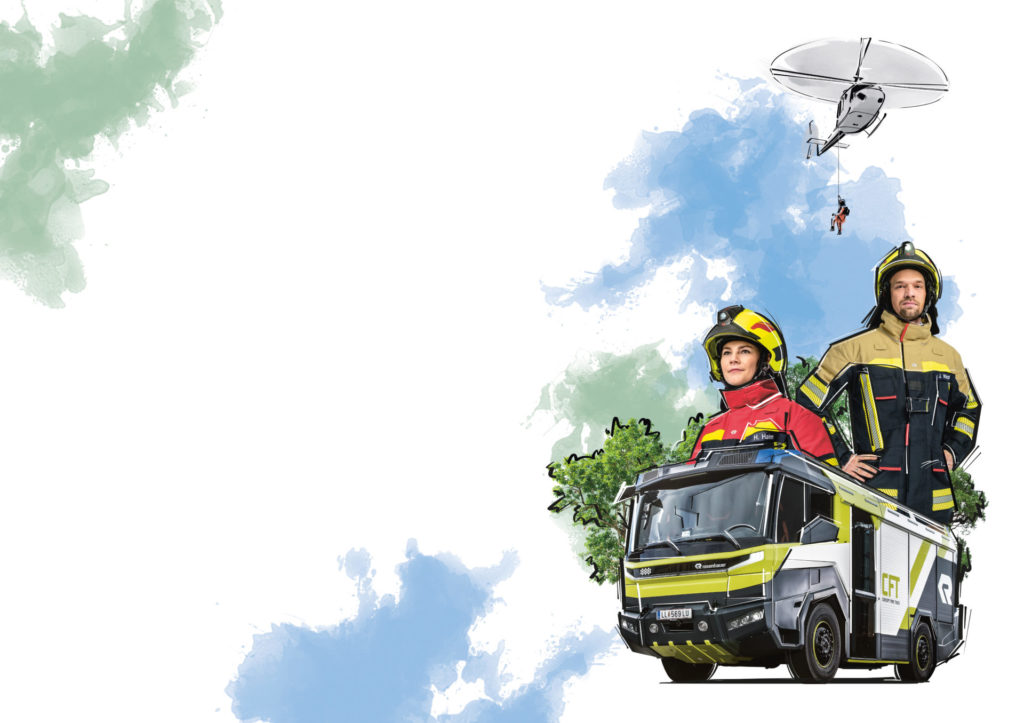▸ Sustainability at Rosenbauer
Sustainability at Rosenbauer
Ever since its foundation in 1866, Rosenbauer has been one of the most innovative companies in the firefighting industry. The family business has always considered stable growth and responsible, sustainable practices to be a high priority.
UNDERSTANDING AND MANAGING SUSTAINABILITY
Sustainability at Rosenbauer is the responsibility of the Executive Board. Social and environmental responsibilities have always played an important role in the more than 150-year company history. Since 2016, this fundamental strategy has been intensified and tackled systematically to establish modern sustainability management.
We believe attention should be paid to the most important areas of activity along the value chain in all company activities in the long term. In addition to a set of non-financial performance indicators, Rosenbauer has set goals to improve its impact on the climate, environment, employees, customers and companies. Both the indicators and the goals are intended for use as tools to manage sustainability performance and are communicated to stakeholders.

take it on
“You might say: The job is too big. We say: It’s important, so we’re going to take it on.”
DIETER SIEGEL
CEO

DOING BUSINESS SUSTAINABLY
We care about the impact of our business activities and align our business with sustainable practices. Our innovativeness enables us to address global challenges, particularly climate change and the associated natural disasters. Our efficient, high-performance firefighting technology contributes to putting out fires quickly.
THE VALUE CHAIN AND MATERIAL TOPICS
In order to live up to its responsibilities in the field of firefighting and disaster control, Rosenbauer incorporates sustainability issues into every aspect of its strategy. The focus is on the areas which the company can be instrumental in shaping.
The life cycle of a firefighting vehicle begins with the production of the primary raw materials, steel and aluminum, and extends from in-house production to use by firefighters and recycling of obsolete materials.
Procurement and outsourcing
By assembling firefighting vehicles that are delivered direct to customers, Rosenbauer is situated at the top of an international supply chain. The company purchases production materials, prefabricated parts and ready-to-install components from selected long-standing partners.
The Group‘s procurement volume, which also includes commodities, amounts to 69% of revenues on average, most of which goes into purchasing chassis. The suppliers are continuously assessed and involved in optimizing the logistics chain, the environmental impact and product recyclability. Rosenbauer builds long-term relationships with suppliers, and endeavors to create close ties with key partners so that it retains them.
Production at Rosenbauer
Production activities relate primarily to final product assembly. In addition, pump and turret parts and vehicle body components are manufactured in the company‘s own machine centers, such as those for painting, welding or sheet metal working. During this work, heating and process energy, electricity and water consumption, fuels and waste are all relevant environmental factors. Employees‘ innovativeness and expertise, as well as their health and safety are issues of paramount importance.
Use phase
Rosenbauer‘s global customer service organization enables it to be permanently at its customers‘ side. No vehicle is handed over without prior training, and tailored service and maintenance packages are offered for every product. Aging vehicles can be refurbished and restored to state-of-the-art condition at Rosenbauer. Disused vehicles are suitable for recycling due to the materials used. Rosenbauer‘s principal focus is on the safe and ergonomic use of its products, and therefore on support for fire services all over the world. Customers are involved in the development process at an early stage in order to have optimum solutions down the line.
Value chain

Materiality matrix
Identifying material topics
Along the value chain, Rosenbauer has identified numerous topics in which social and ecological impacts play a part. The issues with the greatest influence on and highest relevance for stakeholders were captured in a materiality matrix. The topics in the matrix are unchanged from the previous year. For a meaningful overview, the material topics are divided into the areas of activity Corporate Governance & Compliance, Employees, Products & Society, and Environment & Resources.
The most important topic for all stakeholders was the safety of employees and that of the emergency services while using Rosenbauer products, followed by product reliability and longevity. The stakeholders also attach a high level of importance to energy consumption in Production, to technology and innovation, to employee satisfaction, and to training and continuing professional development.
Rosenbauer’s Sustainability Strategy
The Rosenbauer Group organizes its business operations with a view to ensuring sustainability. The Executive Board fundamentally rejects short-term thinking about quarterly results in favor of management decisions with a long-term perspective, which ensure lasting positive growth for the Group.
Rosenbauer‘s sustainability strategy is based on the existing Mission Statement and values in conjunction with the corporate strategy. Opportunities and risks arising from societal megatrends are important elements that were also considered. The Sustainability Strategy was developed primarily following identification, analysis and mapping of the value chain, and the establishment of material topics based on the company‘s social and ecological impact.
DEVELOPING THE SUSTAINABILITY STRATEGY
Based on this foundation, 2017 was set as the starting point for Rosenbauer‘s Sustainability Strategy. Working with all members of the Executive Board and operational managers, the relevant areas of activity were defined and corresponding guiding principles developed.
The next step in 2018 was to set goals and related measures for the four defined areas of activity: Corporate Governance & Compliance, Employees, Products & Society and Environment & Resources. Clear performance indicators guarantee it is possible to measure and review progress in achieving each goal. The measures and goals were examined and approved by the Executive Board. This process including all operational managers and in-depth discussions of the topics enabled a broad consensus on the direction Rosenbauer‘s strategic sustainability efforts should take in the coming years.
Guiding principles for sustainability at Rosenbauer
INTEGRATION OF THE SUSTAINABILITY STRATEGY IN THE COMPANY
Sustainability is an integral part of Rosenbauer‘s corporate strategy at Executive Board level, thus ensuring the clear delineation of responsibilities and allocation of resources, and integration into all core processes. The Sustainability Strategy is implemented and evaluated by CSR management in accordance with the goals and measures determined annually.
SUSTAINABILITY GOALS
Rosenbauer worked with operational managers to define the following goals in 2018 and specify related measures for the four areas of activity (Corporate Governance & Compliance, Employees, Products & Society and Environment & Resources). The associated performance indicators guarantee it is possible to measure and make progress in achieving the respective goals. Measures specified each year guarantee their implementation.
Sustainability Goals and Status
ROSENBAUER SUPPORTS THE SDGS
In 2015, as the centerpiece of the 2030 Agenda, the United Nations General Assembly adopted a total of 17 global Sustainable Development Goals (SDGs). Rosenbauer considers itself committed to these goals. It has the potential to exert influence, particularly in the five SDGs 3, 8, 9, 11 and 13, as a significant contribution to their implementation could be made via its business activities.
COMMUNICATION WITH STAKEHOLDERS
Rosenbauer considers open communication and mutual dialog among partners to be the prerequisite for developing products and services that have their finger on the pulse and for remaining an innovation leader.
Among the most important stakeholder groups are customers, fire services and firefighter associations around the world, employees, suppliers and sales partners. Other important partners include the owning family and shareholders. Rosenbauer values collaboration with local partners, and therefore also counts local communities and residents as relevant stakeholders.